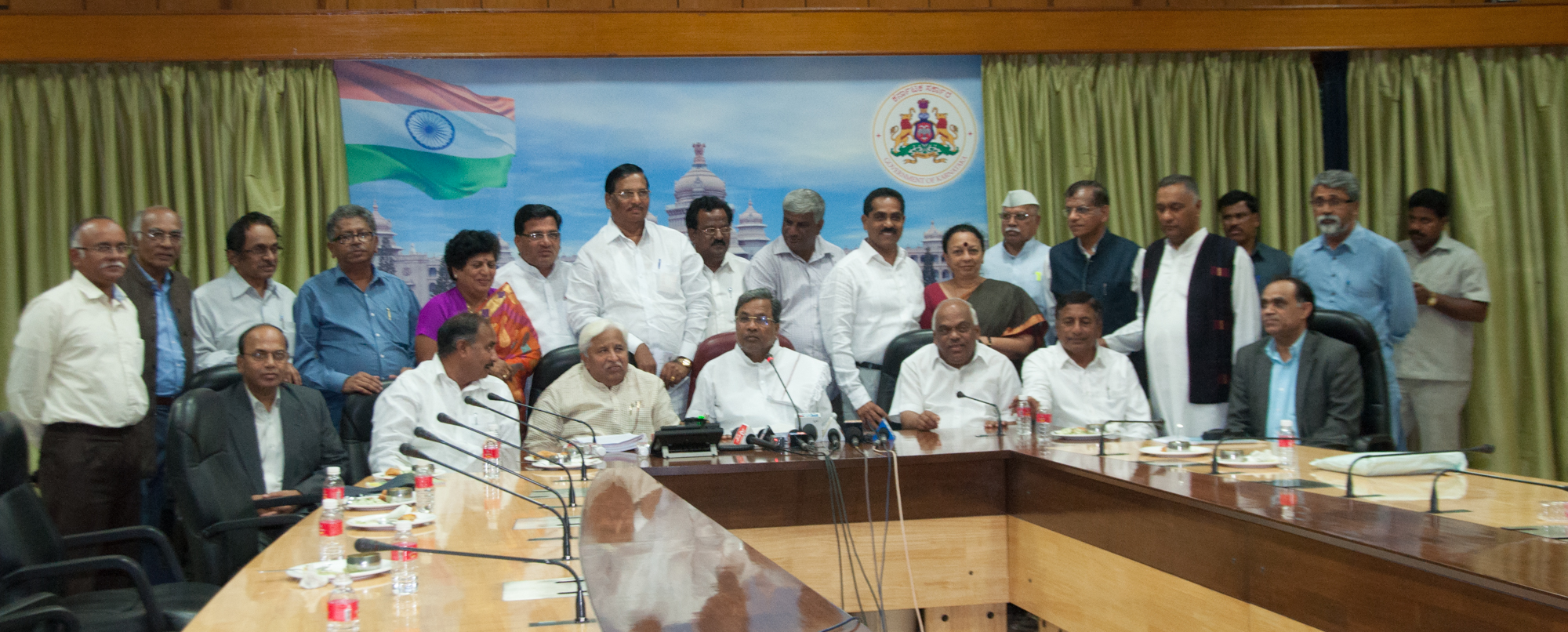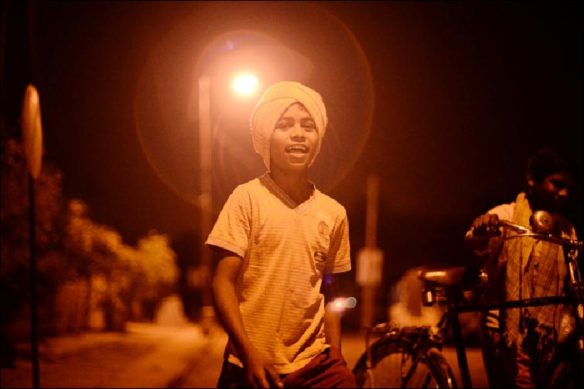Paving the way for Karnataka’s Gram Swaraj
Andolana welcomes the report of the Karnataka Panchayat Raj Act Amendment Committee, 2014

Karnataka Panchayat Raj Amendment Committee with Karnataka Chief Minister, Siddaramaiah (center, seated) and H. K Patil – Minister for Rural Development and Panchayat Raj – Karnataka (third from left, seated)
Grama Panchayat Hakottaya Andolana heartily welcomes the recommendations of the Karnataka Panchayat Raj Act Amendment Committee 2014. Ensuring the realisation of the aspirations of people through Grama Sabhas and Grama Panchayats and upholding the constitutional mandate of the local self governments – the two main objectives of the Andolana find resonance in the recommendations of the Committee. Following our struggles, initiatives, experiments and sustained conversations to empower the Grama Sabhas and Grama Panchayats, the intent of the Committee and its deeply people centered recommendations are both heartening and inspiring. We believe these recommendations contribute significantly to the political decentralisation and empowerment of the Panchayati Raj in Karnataka, thereby making it a role model for the entire country.
In the Committee set up under the chairpersonship of the former Speaker of Karnataka Legislature, Sri. Ramesh Kumar, Smt. Nandana Reddy, Convenor of the Grama Panchayat Hakkottaya Andolana, is one of the core-committee members. The Committee, as part of its review process had carried out 4 regional level consultations in which district representatives of Andolana took part in significant numbers – and presented views and suggestions, which have clearly been received with seriousness and sincerity.
We specially welcome the Committee’s emphasis on the Grama Sabhas and Grama Panchayats and the many suggestions that pertain to them exclusively. For the very first time, the roles and responsibilities of the Grama Sabhas have been clearly articulated and the three levels of the panchayats have been made answerable to the Grama Sabhas that form their constituency. This will ensure a high degree of transparency and accountability.
The emphasis laid on the participation of the most marginalized communities in all aspects of local governance in the Report creates opportunities for the participation of members of the socially disadvantaged groups including women and children. The Committee has recommended that the Special Grama Sabhas for members of the Scheduled Castes and Scheduled Tribes, women and children be mandatory, instead of being driven through annual circulars. By recommending that prior to the ward sabhas, there be hamlet or habitation based sabhas, the Committee has attempted to ensure high community participation both in terms of access as well as making them more meaningful through bottom up planning processes.
In its report, the Committee has argued in detail why and how the devolution of functions, functionaries and finances is critical if the Grama Sabhas and Panchayats have to fulfil their constitutional mandate. As of today, it is not compulsory for government officials to take part in panchayat meetings and to provide required information to them. The Committee makes it clear that the officials are accountable to the decisions taken at the Grama Sabhas and in the Panchayats and that they are answerable to the people and the panchayats they serve.
The Committee’s recommendations include – planning processes that are carried out at the village level, based on the best interests of the community members, with their participation through a systematic process that also takes into account data and statistics; consolidation of plans at the taluk, zilla and state levels in a bottom up manner; setting up of Planning Committees at the taluk, zilla and state levels to discuss the appropriate responses to concerns and to develop comprehensive plans; membership of representatives of the Village and city local governments in all levels of the Planning Committees; absence of provision to change the decisions taken and passed at the local level – All these recommendations protect the interests of the people and the local governments. Andolana believes that they reinforce the sanctity of people’s participation in governance. The Committee also suggests that all the three levels of the panchayats should periodically submit their reports to the Grama Sabha. This will most certainly enhance the accountability of Grama, Taluk and Zilla Panchayats to the Grama Sabhas.
Recommendations to confirm a full 5 year term for the post of the Panchayat President, election of the president by all elected members of the panchayat (as is now), naming the presidents as the Chief Executive Officers of their respective panchayats are all endorsed by the Andolana. They ensure a reasonable time-frame for the functioning of the president and her/his election by other members of the panchyat ensures her/his accountability to them as well as to the Grama Sabha. This will reinforce transparency. There has been a view expressed in the state by few that there should be a direct election of the president by the constituency and it must be stated that the Andolana is totally opposed to it as it undermines participatory democracy – it is glad to note the Committee’s recommendations do not endorse direct election.
The Committee points out that development is not about conducting activities, instead development is fulfilling responsibilities. Instead of the Activity Mapping which is prescribed for the three levels of the government, the Committee has suggested detailed ‘Responsibility Mapping’, identifying the specific responsibilities that have to be carried out at each level of the local government. This will also enhance organic links between the three levels and enable a harmonious functioning among them.
Many of the recommendations by this Committee are quite revolutionary. We urge the government to accept these recommendations, make the required changes in the law and implement them in letter and in spirit.
- Final Draft of the Karnataka Panchayat Raj Act (Amendment) Bill
- Unique Features of the Proposed Amendments to the Karnataka Panchayat Raj Act, 1993
- Salient Features of the Proposed Amendments to the Karnataka Panchayat Raj Act (1993)
- Final Report of the Committee
- Highlights of the Report
- Members of the Committee
- PRI Responsibility Map
- PRI Schedule
- Press coverage of the report submission in The Hindu publication
- Seminar on Karnataka Panchayat Raj Act Amendment Committee Report on 12 Nov 2014
- Mani Shankar Aiyar (Former Union Minister of Panchayat Raj) remarks on the Karnataka Panchayat Raj Act Amendment Committee Report
Kannada


